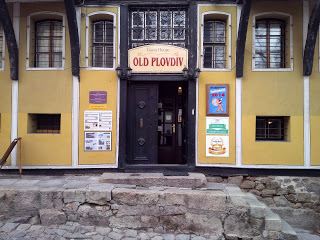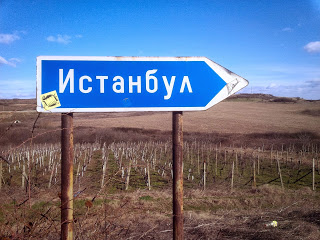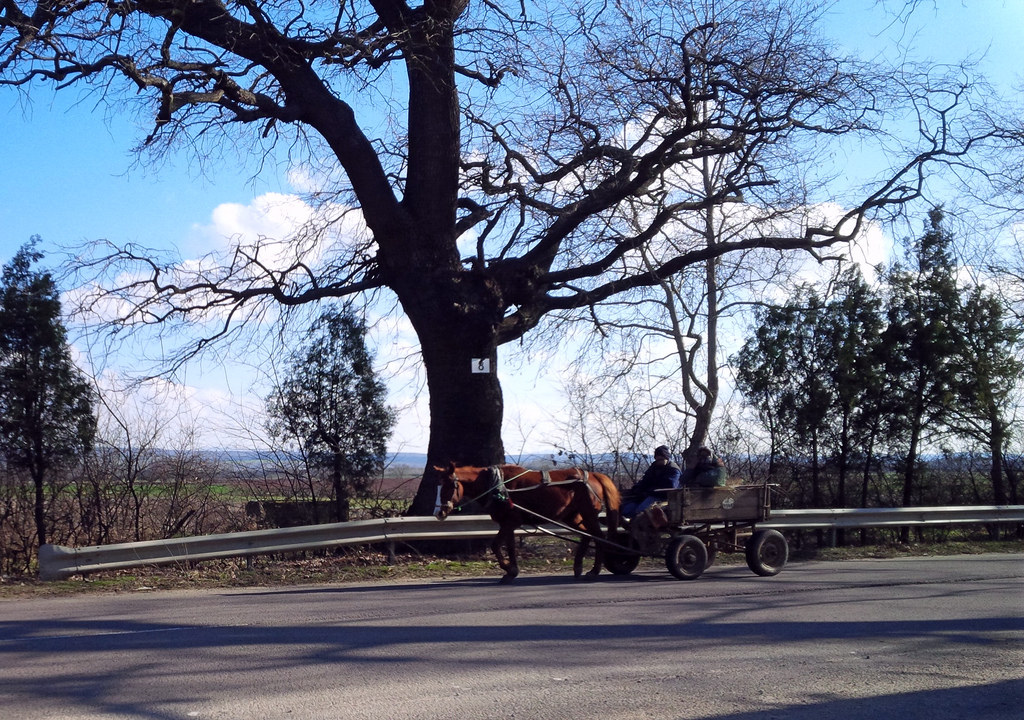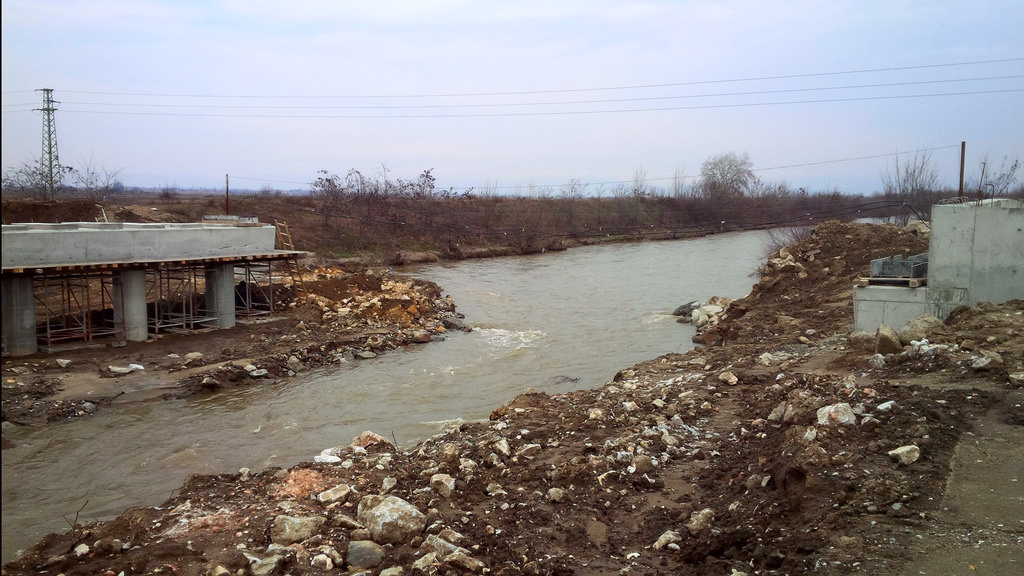
Breakfast was included with the price of the room in Pazardjik on Wednesday. It wasn’t particularly memorable, but at least it provided calories for the day of walking ahead of me. In Sofia, the staff at the hostel had recommended a hostel in Plovdiv, and I’d located it on my GPS app before setting out. I knew it was 38 kms from door to door, so I got underway shortly after breakfast.
When I reached the main traffic circle leaving town, I saw that there were large signs diverting eastbound traffic south because Highway 8 (the direct route) was closed. Great news, since this usually means several kilometres of walking on a smooth road with no traffic. (One day in Italy, I got 18 kms of private road.) In this case, I got a few more car-free kilometres than I’d anticipated. After two hours of walking, I came to the work crew that was resurfacing the road. What I’d had no way of knowing until then was that the bridge that spanned a small river was also part of the work project. It had been removed, but not yet replaced. The water was flowing swiftly, and it was too muddy for me to see anything beneath the surface.
I started downstream to the nearest bridge, following the cowpath on the top of the levee. It was actually a nice walk, and at one point I spotted a heron. Once I crossed the bridge and reversed direction, however, I became aware of a small breeze blowing into my face from the north. It wasn’t much, just enough to convince me to add another layer. By the time I completed my 6 km scenic detour, I decided it was time for lunch. The construction site on the east side of the river had a conveniently sized rock, so I sat down, pulled out my supplies, and refreshed myself.
As I’d suspected from looking over the maps provided with my GPS app, there wasn’t a whole lot of anything along the route, but I still managed to find places to sit and take the load off every 90 minutes or so. The road took me just north of the southern range of mountains, and the walk trended gently downhill all day – my hostel in Plovdiv is 60 m lower then the hotel in Pazardjik, and the hostel is located on one of the six hills in the city. There was a bit of a steep climb up the cobbled road, but I arrived feeling very good. I’d been maintaining a pace of 6 km/h for the last few hours of the day, only slowing down once I hit the sidewalk on the outskirts of Plovdiv. I used the last few kilometres as a “cool down” after the fairly intense walking I’d been doing until then.
When I arrived at the Old Plovdiv Hostel, I was told that the hostel was fully booked for Friday night, so I could only stay two nights. Turns out that Lonely Planet had listed the hostel listed as the fourth best hostel in the world for 2014 in the category of “best value” stays. (Anyone planning to stay here in the summer would do well to book at least four months in advance.) I stayed up quite late chatting with the Lebanese-Bulgarian night clerk, but I was still up early Thursday morning.
From the hostel, I set out to explore the “Old Town” district which spans three of the six hills in the city. Most of the extant houses were built in the 19th century in a particularly Plovdivian expression of the National Revival style. (Photos coming soon to Flickr.) The current Church of Sts Constantine and Helen dates to the same period, but the first church on the site was erected in the 4th century. The ornate “Bulgarian Renaissance” appointments and the typical 19th century iconography were not particularly inspiring to me, but just as in Pazardjik, there was something about the church which drew me to prayer. A few doors down, the City Art Gallery had an icon exhibit hosted in a building in the church complex. For an admission fee of 4 Bulgarian Leva (€2), I had the place to myself. Again, as a matter of personal stylistic preference, I found myself most drawn to the icons dating to the 15th and 16th centuries.
Continuing on, I came to the ancient Roman amphitheatre which had been built in 114-117 AD in the saddle between two hills overlooking the city. The site had only been rediscovered in the 1980s, and extensive reconstruction work had been required to piece together the stage and seating. It’s estimated that it originally held 6,000 people, but when it’s used as a venue for folk music festivals or concerts now, it only seats 4,000. The Acadamy of Music, Dance, and Fine Arts is located directly behind it, as is the Faculty of Biology of the local university.
It was a short walk down the other side of the hill to the Cathedral of the Dormition of the Theotokos. As with many of the churches I’ve visited in Bulgaria, this was a 19th century reconstruction on the site of a much earlier church. Although the Orthodox Church in Bulgaria had been an autocephalous church in the early mediaeval period, the fall of Bulgaria to the Ottoman Empire in the 14th century meant that all Orthodox Christians were subjects of the “Rum Millet.” It was only in 1858 that the bishop of Plovdiv broke with five centuries of practice and celebrated a Liturgy in Bulgarian instead of Greek, and it was in this church that he did so. This reassertion of Bulgarian national identity came after several decades of increasing prosperity for Bulgarians. Schools were established, privately funded, and various secret societies dedicated to the overthrow of the Turkish yoke sprang up. The revolution which followed was brutally crushed by the Ottomans, and the European powers took note. Finally Russia intervened, and in 1878 her armies defeated the Ottomans and secured independence for Bulgaria. The subsequent partition of territory was opposed by England, France, and Austro-Hungary because they feared an expansion of Russia’s influence in the Balkans, and a new treaty was drawn up which split Bulgaria into an independent state with Sofia as its capitol and an Ottoman dependency known as East Rumelia with its capitol in Plovdiv. The final unification of modern Bulgaria was effected on the 6th of September1885, and it was in Plovdiv that this was formalised. The president of Bulgaria celebrates the national holiday every year in Plovdiv for this reason.
From the church yard, there was a good view over the city. I kept moving downhill towards the minaret I saw from above. This is one of two functioning mosques in Plovdiv, which also has a synagogue, a Catholic church, and several Protestant churches. The mosque was initially built in the 14th century following the capture of the city by the Ottomans. Earthquake and fire necessitated its reconstruction on several occasions, but it’s still fundamentally the same building. The large pedestrian square nearby has a portion of the Roman stadium revealed. Archeologists had suspected there was a stadium in the city, but were uncertain of its location until excavations in the 20th century uncovered it. The stadium was completely intact, but the majority of its 240 m length is beneath a modern street and the foundations of the historically significant modern buildings on either side. Plans are being prepared to create an underground museum, although funding this will be difficult.
I walked along the pedestrian street as far as the city centre, with the central post office dominating the east side of the large square and an extensive park stretching south and west. Two large sections of the Roman city are also visible near the post office, and once the sun finally broke through the clouds I walked down through the ruins along the vast paving stones.
After lunch at a café, I met several other visitors for the free walking tour of Plovdiv. These normally last about two hours, but our group kept the guide almost half an hour longer. (Constantin was my source of information provided above about Bulgarian reunification.) One of the frustrations I’ve experienced on this trip arises from seeing so little of a given city because I simply don’t have the time to research and explore. I’m resigned to this reality, but the city walking tours I’ve taken have been rewarding experiences, even with the limitations they have. (But still, there is so much of which I will remain ignorant!)
For dinner, I went to an excellent local restaurant that my Lebo-Bulgarian friend had recommended, and spent the rest of the evening on one of the hostel’s computer terminals using Google Maps to plan out my next week or so of walking.
Friday morning I was awake before my alarm, and after a leisurely breakfast (my favourite kind!) I borrowed an umbrella from the hostel and set out for the bus terminal. It was a grey and blustery day with rain in the forecast for twelve hours, beginning in the early afternoon. (I was quite glad when they told me there’d been a cancellation and I could spend an extra night at the hostel.) My father’s Bulgarian friend had recommended that I visit the 11th century monastery near the town of Bachkovo. When I arrived at the terminal, I learned I had missed the hourly bus by five minutes, so after buying a ticket for the equivalent of €2, I settled down and started composing this update.
The monastery in Rila is bigger and more impressive architecturally, but I enjoyed my visit to the Bachkovo monastery more. Perhaps part of that was the freedom I felt to take my time and explore, whereas my trip to Rila had a driver and two other people who I could not keep waiting. Even more significant was that at Bachkovo, the monks were interacting with the guests. I saw one monk deep in conversation with a young man, and I was also approached in a friendly manner. Our mutual incomprehension didn’t hamper the exchange of brotherly love.
After taking the time to soak in the atmosphere, I headed towards the main gate, pausing briefly to examine the multilingual information board. That’s where I learned there’s a small museum on the grounds. I hadn’t seen any signs, so I approached a passing monk and asked about it. He pulled out a smartphone and placed a short call, then told me to wait where I was. Very soon afterwards, an English-speaking man with a set of keys introduced himself and explained there were two sections. The old refectory, built in 1643, had been covered with frescos, and they were extremely well preserved. Photography is prohibited, so I took my time inside. I was delighted to see depictions of several Greek philosophers on the walls. They didn’t have halos, and rather than “Agios” (holy or saint), they were labelled as “Sophos” (wise). Socrates, Plato, Aristotle, Diogenes, and Galen were present, along with three others who I didn’t recognise. The other part of the museum had display cases and bilingual cards beside each item. The most fascinating pieces were the small wooden crosses with very fine details carved by hand.
Taking my leave, I headed towards the bus shelter. There was no schedule posted, but less thn five minutes later, my ride appeared. The bus was very warm and the seats nice and soft. I was soon sound asleep. I missed my stop in Plovdiv, but realised what had happened after a few short blocks. The bus driver obligingly pulled over and I headed to the supermarket I’d spotted near the terminal earlier in the day. I picked up a few things for dinner and to eat on the road Saturday. Rather than walk half an hour through the cold wind and blowing rain, I hailed a taxi at the bus terminal. Five minutes later, I paid my €2 taxi fare and entered the hostel. With the rain blattering outside, I had no need or desire to go out again.
After dinner, I settled in to finish writing this post, but soon fell into conversation with an Australian who had spent a semester studying microbiology in Edinburgh and was now taking the scenic route home. We spent the best part of the evening talking, and exchanged URLs. Trish’s travel blog is at scenicroute.ghost.io
Saturday morning I was up early again, and I am currently enjoying a post-breakfast coffee before I head back to the room and start packing up. At least two other people in the room are now awake, so I won’t feel too guilty about the noise I’ll make. Then it’s farewell and a 40 km hike along Highway 8 to Debar. The forecast is calling for a partly cloudy day with a high of 7, so it should be good walking weather.
BREAKING NEWS: Silva, the Lebanese woman who works at the hostel, brought some ahwe in to work with her this morning, and poured me a cup. Oh, that is good coffee!!!





